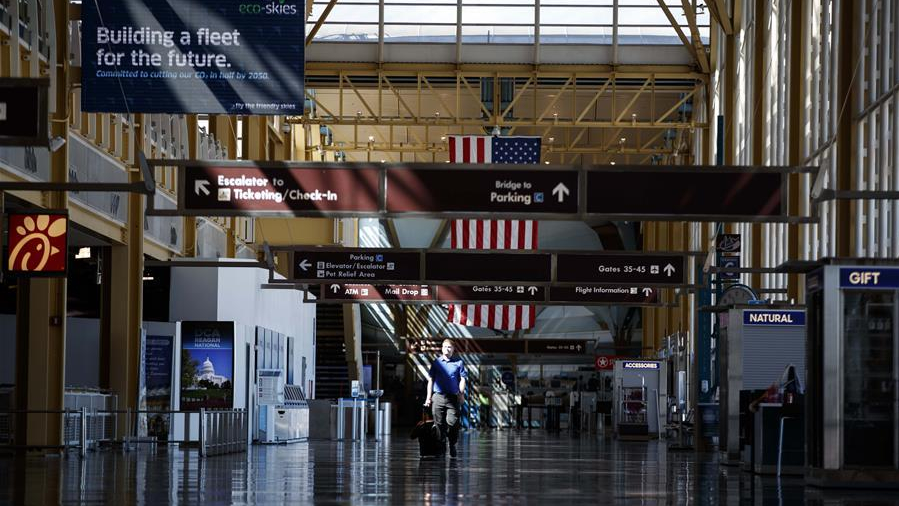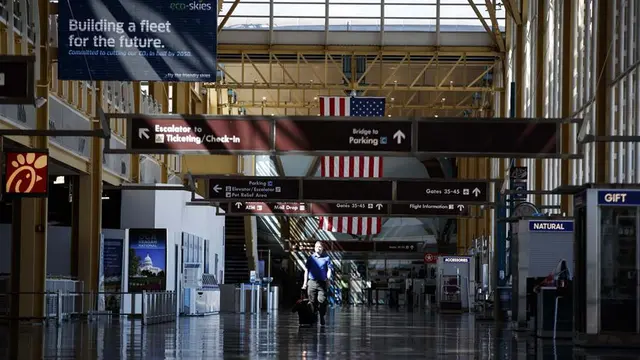
An almost-empty terminal building at Ronald Reagan Washington National Airport in Arlington, Virginia, U.S., March 30, 2020. /Xinhua
Editor's note: Hannan Hussain is a foreign affairs commentator and author. He is a Fulbright recipient at the University of Maryland, the U.S., and a former assistant researcher at the Islamabad Policy Research Institute. The article reflects the author's opinions and not necessarily the views of CGTN.
The Trump administration has earned significant credit with U.S. healthcare workers and scientists, secured the availability of personal protective equipment, and made historic gains on its COVID-19 vaccine acceleration program, according to the chief of the White House Coronavirus Task Force.
Vice President Mike Pence's remarks come at a time when the United States hit its highest daily COVID-19 death count since the pandemic began, shooting past 3,300 on Thursday, a surge that dwarfed Wednesday's record-setting daily death margins. Current COVID-19 hospitalizations also appear at a six-digit high, an all-time record that is exacerbated by one of the highest per capita infection rate trajectories in some American states. These contributing realities remain a distant priority for the serving president.
Given the trajectory of America's exponential COVID-19 surge this week, there is reason to believe that significant governance shortcomings alone will carry the virus death toll average into the coming weeks. Consider the fact that the federal government once again failed to meet its own supply targets for COVID-19 personal protective gear, despite officials busy manufacturing a success narrative on their service to first responders.
Healthcare workers could still derive much-needed benefit from the first shots of a Pfizer COVID-19 vaccine, which received an endorsement from the Federal Drug and Administration (F.D.A.)'s crucial vaccine advisory panel on December 10. "With the high efficacy and good safety profile shown for our vaccine, and the pandemic essentially out of control, vaccine introduction is an urgent need," stated Pfizer's vaccine research chief during Thursday's meeting.
But to ensure that this benefit actually materializes across all 50 states in due time, there is a dire need to synthesize and streamline vaccine distribution operations between federal and local health authorities. Evidence from the Republican-controlled Senate suggests that such a consensus can't even prevail on the pandemic relief front yet, limiting overnight optimism for a national vaccine distribution strategy that encourages minimum distribution variation between states.
In the Senate, Democrat and Republican lawmakers have wrangled over the final make-up of an expected $1.4 trillion COVID-19 spending measure, as key members show signs of prioritizing "request votes on other matters" instead of the widely acknowledged need of the hour. These staggered policy advances offer important lessons on prospective vaccine rollout difficulties for American states, given that many states are tasked with first mitigating unaddressed federal impacts of pandemic-induced economic exigencies, including ramped-up jobless benefits claims. Early claims for state unemployment benefits shot past 137,000 to 853,000 this month, its highest point since mid-September during the pandemic.
Note that timely vaccine distribution funds are not only critical to ensuring that the same states accommodate thousands of vaccine doses in real-time. It would also be critical to eliminating a fundamental risk: to prevent incoming funds from being soaked up by battered economic growth across states and citizens' immediacy to avail jobless benefits.
Henceforth, federal lawmakers' need to prioritize the economics of pandemic relief is now – not later.

A security guard stands at the COVID-19 Community Treatment Facility, December 2, 2020. /Getty
It is also at this juncture that presidential initiative becomes a vital resource to offset state-to-state exposure to multiple pandemic-induced exigencies at the same time. As president, Trump has significant proximity to the prevailing bureaucratic consensus in the U.S. Treasury on Fed programs and is also better placed to influence motivations that may limit policy support to Congress-sanctioned COVID-19 safety nets. A closer look at the build-up of America's record-breaking COVID-19 death counts in recent days shows that the absence of federal directives on basic pandemic controls may compel states to take drastic measures, including a restrictive reading on start-stop economic activity to compel headway on public health safety.
This, in turn, raises the specter of millions standing to lose their incomes at the hands of the outgoing administration's negligence, where the idea of bolstering "public confidence" through vaccine distribution risks under compensating American suffering as a whole.
Unlike Trump, president-elect Joe Biden has demonstrated awareness of an incoming vaccine's potential limitations, placing a premium on its associated economic challenges and state-federal distribution discords. "Vaccines don't equal vaccinations," said the Biden-Harris transition team in a statement. "Before I take office … we will need Congress to fund our distribution efforts."
Grounding his confidence in a recently disclosed 100-day pandemic response plan, Biden and his team signal a broader point on managing premature vaccine triumph narratives. A vaccine rollout comes with no ironclad guarantee of specific immunization timeframes for American citizens, be it a few months to nearly a year of anticipated immunity. It is thus crucial for the national leadership to effect a climate of social conformity and collective prevention that can ensure that the weight of preemptive governance is felt knee-deep into the vaccine rollout.
Instead, the Trump administration remains determined to maintain a victory narrative on COVID-19 containment, death reduction, and vaccine development – even when many signs point to the contrary.
The fear is that as the worst is yet to come, no amount of national suffering will be enough to compel a leadership perspective shift.
(If you want to contribute and have specific expertise, please contact us at [email protected].)
 简体中文
简体中文





